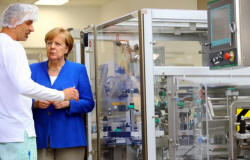German business morale ebbs as trade dispute ramps up
 Send a link to a friend
Send a link to a friend
 [June 25, 2018]
By Joseph Nasr and Michael Nienaber [June 25, 2018]
By Joseph Nasr and Michael Nienaber
BERLIN (Reuters) - Business confidence in
Germany fell in June to its lowest in more than a year, suggesting the
mood among company executives is darkening as the world edges toward a
full-blown trade war.
Activity declined in all four sectors measured by the Munich-based Ifo
institute in Monday's survey - manufacturing, services, trade and
construction.
The readings added to signs that Europe's biggest economy is cooling
after a strong 2017, though economists said a recession was not on the
cards.
Ifo said its business climate index fell to 101.8, the lowest level
since May 2017 and just beating a Reuters consensus forecast of 101.7.
The index has now fallen in six of the last seven months.
"The boom is over... The discussion about a trade war ...is weighing on
the mood. Uncertainty has increased slightly," Ifo economist Klaus
Wohlrabe told Reuters.

The institute said the June reading was taken before a row over
migration broke out within Germany's governing coalition that one
economist called potentially more damaging than the tariff dispute.
Observers predicted the economy would continue to grow, albeit at a
slower pace than last year's 2.5 percent.
"The modest fall reaffirms our ...narrative of an economy slowing to a
normal growth level," Uwe Burkert of LBBW bank wrote in a note. "This is
however no downturn and certainly no recession."
Much of the German data published this year has pointed to a cooling
economy.
Industrial activity and exports were weak in the first four months, and
U.S. President Donald Trump is threatening to impose hefty tariffs on
car imports from Europe - a trade that Germany dominates - on top of
earlier unilateral duties on metals.
Business leaders are worried that a parallel trade confrontation between
Washington and Beijing could harm German exporters who rely on the
world's two largest economies for growth.
[to top of second column] |

German Chancellor Angela Merkel visits the production line of the
new Takeda pharma factory in Oranienburg, Germany, June 16, 2017.
REUTERS/Hannibal Hanschke/File Photo

'NEVER COUNT GERMANY OUT'
Of potentially greater concern is a row over immigration within Chancellor
Angela Merkel's conservative alliance that has unsettled her coalition
government three months after it took office.
The Christian Social Union (CSU), the Bavarian sister party of Merkel's
Christian Democrats (CDU), is threatening to impose entry restrictions at the
border with Austria if she fails to secure a deal to distribute migrants more
fairly among European countries at an EU leaders' summit this week.
Merkel conceded that leaders had failed to find a joint solution to the issue in
emergency talks on Sunday.
ING Diba economist Carsten Brzeski said German could easily weather existing
U.S. tariffs on aluminum and steel, and "even significant U.S. import tariffs on
cars might not affect demand, particularly if the euro remains weak."
But should the migration row cause Merkel's government to collapse and trigger a
snap election, more serious economic damage was likely.
"For the economy, this would mean further delays of the urgently needed
investments, new structural reforms and strengthening of the (European) monetary
union," said Brzeski.
But in reference to the underperforming national soccer team's last-minute
victory in Saturday's World Cup match against Sweden, he added: "Never count out
Germany. Hope dies last, even if it takes until the very last second."
(Writing by Joseph Nasr; editing by John Stonestreet)
[© 2018 Thomson Reuters. All rights
reserved.] Copyright 2018 Reuters. All rights reserved. This material may not be published,
broadcast, rewritten or redistributed.
Thompson Reuters is solely responsible for this content.
 |